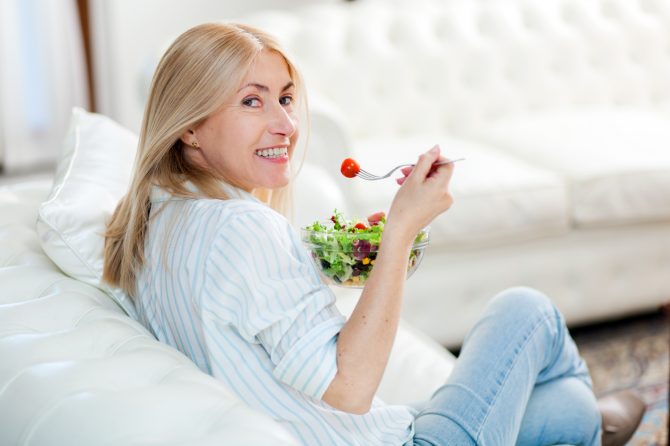
Diet from the age of 40: Ensuring wellbeing before, during and after menopause
Menopausal transition does not affect all women equally, in the same way that it does not start at a specific age for all. Typically, the first symptoms associated with this new life stage begin at 45-50 years. One year later the definitive cessation of menstruation i.e. the menopause follows (usually between 50 and the 51 years, although sometimes it is delayed until 55).
The term ‘climacteric syndrome’ encompasses all possible alterations that can affect the quality of life of women during this pre and postmenopausal period: changes in menstrual pattern, no menstruation, abnormal bleeding and several pathologies due to hormonal changes. These hormonal changes mean that in most cycles there is no ovulation and that there are pathologies such as excessive growth of the endometrium or hyperplasia, fibroids, ovarian functional cysts and changes in the breasts.
In response to all these changes, even anticipating them from the age of 40, women should:
- Practice exercise on a regular basis.
- Give up smoking.
- Moderate alcohol consumption.
- Avoid other toxins or drugs.
- Have an active and safe sexual life.
- Find a balance between work and family life and leisure.
- Go to regular medical check-ups.
Also diet is one of the determining factors to take care of women’s health after 40 years.
Menopausal transition: nutritional advice for women over 40
Women over 40 should adjust their diet with several objectives in mind. First, reduce the increase in body fat while controlling blood cholesterol levels. This means limiting the intake of total calories, reducing the consumption of pastries, snacks and fast food as much as possible. Second: increase the intake ‘heart-healthy foods’ and those rich in omega-3, plant proteins, phytoestrogens, soluble fiber, calcium and vitamin D.
Recommended foods for women over 40
Omega-3: blue fish (salmon, mackerel, tuna …), chia seeds, flaxseed oil, nuts…
Vegetable proteins: quinoa, seitan, spirulina, chia seeds, legumes, brown rice…
Phytoestrogens: flaxseed and other seeds, nuts, tofu, soy milk, lentils, broccoli, squash, cabbage, onions…
Soluble fiber: oat bran, barley, seeds, beans, lentils, strawberries, apples…
Calcium: dairy products (cheeses), sardines in oil, seafood, nuts and legumes.
Vitamin D: salmon, sardines, tuna, cod liver oil, egg…
Special mention deserves the contribution of calcium, that should be especially high: 1,200 to 1,400 mg of calcium per day. In some cases, when the bone mass is specially low, lower than the desired, it will be convenient to incorporate calcium supplements may be required.
In addition, over the years the ability of the skin and kidneys to synthesize vitamin D decreases. Similarly, current lifestyle habits tend to limit sun exposure, since few jobs can be done outdoors. Therefore some women may also need to take supplements of this vitamin, always under medical supervision.
We hope this article has been useful for you. You will find further information at the website of the Unidad de la Mujer. You can also contact us at the number (+34) 917 303 673


